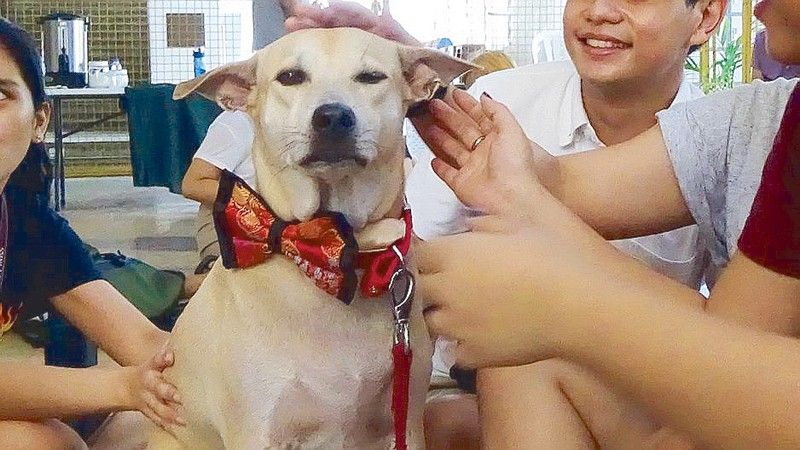Stressbusters: ESAs to the rescue

Across the campus, it is not uncommon to see students taking a break from the rigorous demands of their classes to spend time with animals who have found a home in the university.
This year, officials have formally enlisted the help of these canine and feline residents of the university campus to provide emotional support to members of the academic community, especially students, during particularly stressful periods such as examination weeks.
Take Fyt for example.Trained as an explosive detection dog previously assigned at the Iloilo International Airport, the now-retired Dutch Shepherd has found a way to provide a different kind of security to members of the university community.
Jakey, an aspin based at the university’s tennis court, is often seen around the campus and is particularly fond of members of the varsity teams.
Meanwhile, at the College of Mass Communication (CMC), Cotton may be seen hanging around with students, faculty and staff who have nursed him to health when he first came to the college as a thin and mangy stray last year.
“The Emotional Support Animals (ESAs) program aims to provide emotional support and resilience to all our stakeholders, not just our students,” UP Diliman vice chancellor for student affairs Jerwin Agpaoa tells STARweek.
“Initially, we enlisted the help of dogs owned by some administrators and faculty, as well as those that have already found a home in UP. Over time, we have also included cats in the program,” he adds.
The initiative, says Agpaoa, ensures that a system is in place to guarantee the welfare and safety of both the animals and the humans.
For instance, during overnight review sessions on exam weeks, ESAs participate in the program in “shifts” and always have handlers with them to ensure they do not become stressed themselves.
According to Agpaoa, from the initial two emotional support dogs introduced when the program was launched in February, the university now has 25 dogs and cats that are part of the initiative.
Last month, Fyt, Jakey and Cotton – along with some of their fellow ESAs – led the opening of an exhibit held in celebration of World Animal Month.
The exhibit featured the different emotional support animals of the university, including the CMC cats named after chocolate brands (Kitkat, Twix, Reese and Delfi) and the dogs based in different parts of the campus.
The ESA initiative is part of a larger program implemented by the university to manage the animals inside the campus, according to UP Diliman vice chancellor for community affairs Ernie Lope.
Lope, who chairs the campus animal management committee, stressed the need to implement a program that would address the presence of animals in the campus.
At 493 hectares, the university is believed to be the home of thousands of cats and dogs, including those in the residential areas.
“From the safety viewpoint, this is very significant,” he says, stressing the need to ensure that the animals, especially those based in academic units, are properly vaccinated.
There have been complaints in the past involving animals on campus, Lope recalls, citing a handful of incidents of people getting bitten after inadvertently stepping on an animal or getting too close to one that is not used to people.
But removing them altogether was not seen as the solution.
In fact, he says, this may even worsen the problem as it would attract more animals to take over the cleared areas.
Instead, the university implemented the Trap, Neuter, Vaccinate and Return (TNVR) program to help manage the animal population and ensure that those that interact with members of the community are properly vaccinated.
The program involves humanely trapping the animals, which would then be spayed and neutered as well as given vaccines for rabies and other diseases. After recovery, they are returned to the areas where they were captured.
Lope says some 500 animals have already gone through the program, with another 400 expected to do so before the end of the year.
Officials say the academic community has been very receptive of the animal management program and the ESA initiative implemented by the university.
Lope notes the increasing support from different stakeholders in their efforts to spay or neuter and vaccinate the animals.
Agpaoa, meanwhile, says students have really warmed up to the emotional support animals of the university.
“We’re glad that we were able to include this to our program and hopefully we’ll be able to include more initiatives primarily to help our students cope with different problems that usually challenge their mental well-being,” he adds.
- Latest
- Trending


















